#include <GuardField.hh>

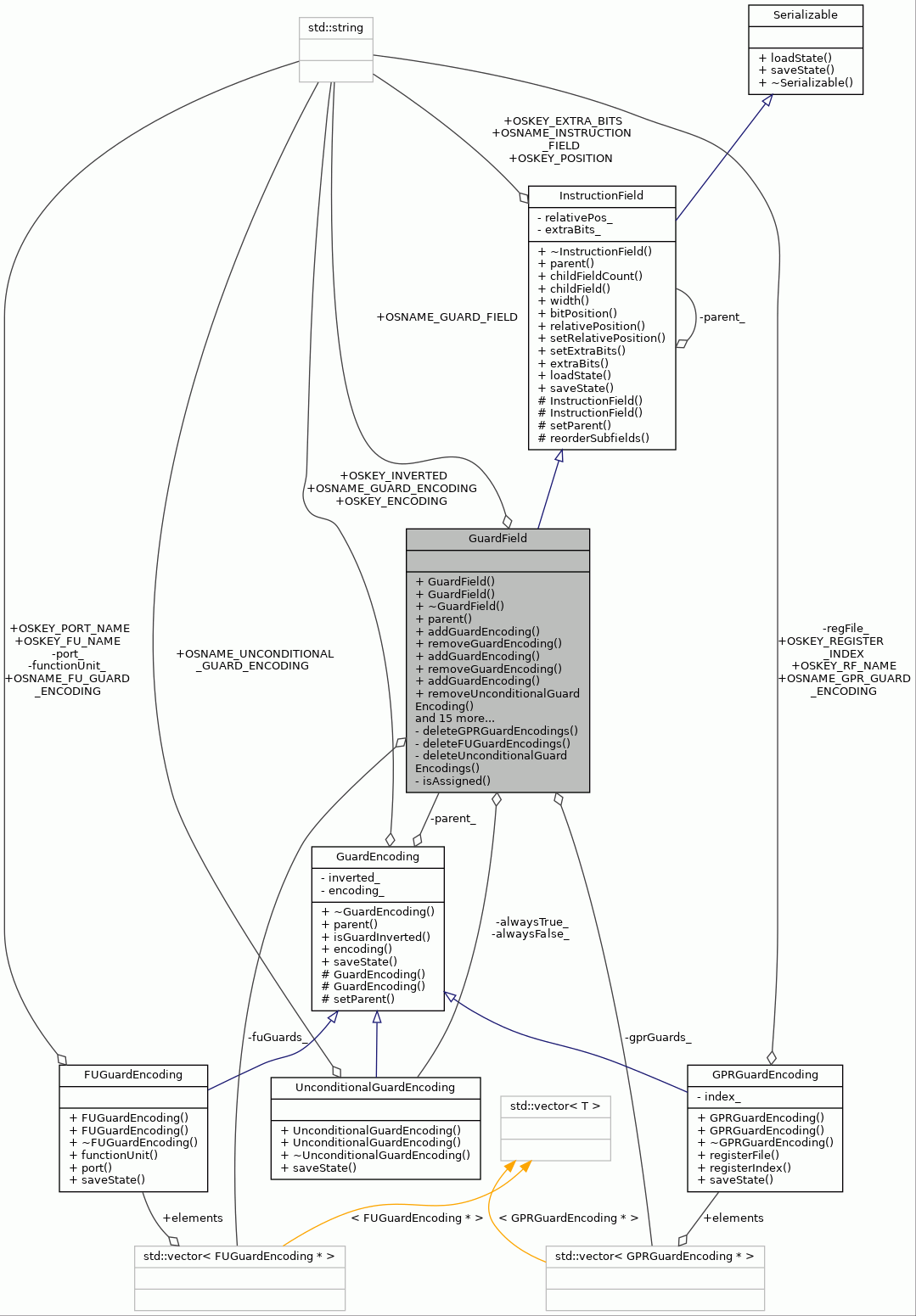
Public Member Functions | |
| GuardField (MoveSlot &parent) | |
| GuardField (const ObjectState *state, MoveSlot &parent) | |
| virtual | ~GuardField () |
| MoveSlot * | parent () const |
| void | addGuardEncoding (GPRGuardEncoding &encoding) |
| void | removeGuardEncoding (GPRGuardEncoding &encoding) |
| void | addGuardEncoding (FUGuardEncoding &encoding) |
| void | removeGuardEncoding (FUGuardEncoding &encoding) |
| void | addGuardEncoding (UnconditionalGuardEncoding &encoding) |
| void | removeUnconditionalGuardEncoding (UnconditionalGuardEncoding &encoding) |
| int | gprGuardEncodingCount () const |
| GPRGuardEncoding & | gprGuardEncoding (int index) const |
| bool | hasGPRGuardEncoding (const std::string ®File, int index, bool inverted) const |
| GPRGuardEncoding & | gprGuardEncoding (const std::string ®File, int index, bool inverted) const |
| int | fuGuardEncodingCount () const |
| FUGuardEncoding & | fuGuardEncoding (int index) const |
| bool | hasFUGuardEncoding (const std::string &fu, const std::string &port, bool inverted) const |
| FUGuardEncoding & | fuGuardEncoding (const std::string &fu, const std::string &port, bool inverted) const |
| bool | hasUnconditionalGuardEncoding (bool inverted) const |
| UnconditionalGuardEncoding & | unconditionalGuardEncoding (bool inverted) const |
| virtual int | childFieldCount () const |
| virtual InstructionField & | childField (int) const |
| virtual int | width () const |
| virtual void | loadState (const ObjectState *state) |
| virtual ObjectState * | saveState () const |
 Public Member Functions inherited from InstructionField Public Member Functions inherited from InstructionField | |
| virtual | ~InstructionField () |
| InstructionField * | parent () const |
| int | bitPosition () const |
| int | relativePosition () const |
| virtual void | setRelativePosition (int position) |
| void | setExtraBits (int bits) |
| int | extraBits () const |
 Public Member Functions inherited from Serializable Public Member Functions inherited from Serializable | |
| virtual | ~Serializable () |
Static Public Attributes | |
| static const std::string | OSNAME_GUARD_FIELD = "guard_field" |
| ObjectState name for guard field. | |
 Static Public Attributes inherited from InstructionField Static Public Attributes inherited from InstructionField | |
| static const std::string | OSNAME_INSTRUCTION_FIELD = "instr_field" |
| ObjectState name for instruction field. | |
| static const std::string | OSKEY_EXTRA_BITS = "extra_bits" |
| ObjectState attribute key for the number of extra bits. | |
| static const std::string | OSKEY_POSITION = "position" |
| ObjectState attribute key for the relative position of the field. | |
Private Types | |
| typedef std::vector< GPRGuardEncoding * > | GPRGuardTable |
| A container type for GPR guard encodings. | |
| typedef std::vector< FUGuardEncoding * > | FUGuardTable |
| A container type for FU guard encodings. | |
Private Member Functions | |
| void | deleteGPRGuardEncodings () |
| void | deleteFUGuardEncodings () |
| void | deleteUnconditionalGuardEncodings () |
| bool | isAssigned (unsigned int encoding) const |
Private Attributes | |
| GPRGuardTable | gprGuards_ |
| GPR guard encodings. | |
| FUGuardTable | fuGuards_ |
| FU guard encodings. | |
| UnconditionalGuardEncoding * | alwaysTrue_ |
| Unconditional guard encoding for always-true expression. | |
| UnconditionalGuardEncoding * | alwaysFalse_ |
| Unconditional guard encoding for always-false expression. | |
Additional Inherited Members | |
 Protected Member Functions inherited from InstructionField Protected Member Functions inherited from InstructionField | |
| InstructionField (InstructionField *parent) | |
| InstructionField (const ObjectState *state, InstructionField *parent) | |
| void | setParent (InstructionField *parent) |
 Static Protected Member Functions inherited from InstructionField Static Protected Member Functions inherited from InstructionField | |
| static void | reorderSubfields (ObjectState *state) |
Detailed Description
GuardField class represents the guard field of the move slot.
The guard field defines the guard expressions that control whether a data transport is completed or cancelled. A GuardField instance contains the control codes that identify the guard expressions supported by a given move slot. GuardField is an instruction field, hence it is derived from class InstructionField. GuardField instances cannot exist alone; they belong to a move slot and are registered to a MoveSlot object at construction time.
Definition at line 55 of file GuardField.hh.
Member Typedef Documentation
◆ FUGuardTable
|
private |
A container type for FU guard encodings.
Definition at line 105 of file GuardField.hh.
◆ GPRGuardTable
|
private |
A container type for GPR guard encodings.
Definition at line 103 of file GuardField.hh.
Constructor & Destructor Documentation
◆ GuardField() [1/2]
| GuardField::GuardField | ( | MoveSlot & | parent | ) |
The constructor.
Registers the guard field to the parent move slot automatically.
- Parameters
-
parent The parent move slot.
- Exceptions
-
ObjectAlreadyExists If the parent move slot has a guard field already.
Definition at line 60 of file GuardField.cc.
References MoveSlot::hasDestinationField(), MoveSlot::hasSourceField(), parent(), MoveSlot::setGuardField(), InstructionField::setParent(), and InstructionField::setRelativePosition().
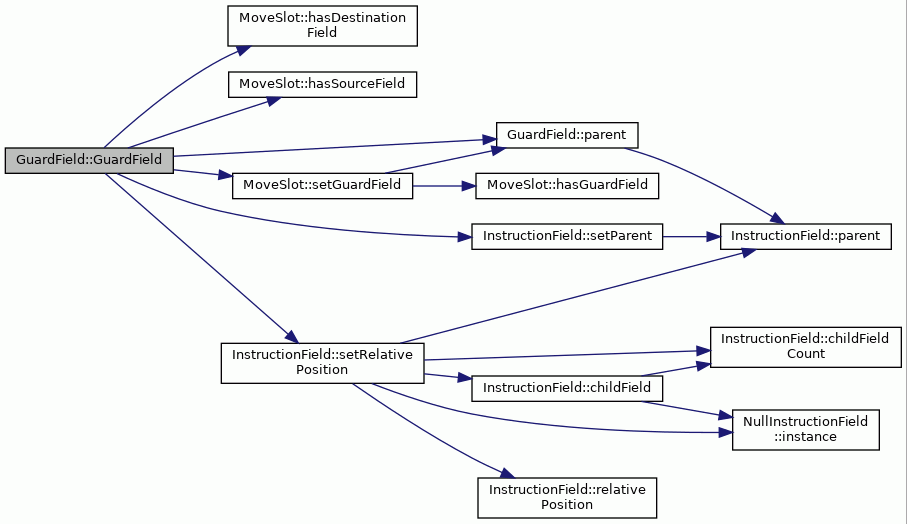
◆ GuardField() [2/2]
| GuardField::GuardField | ( | const ObjectState * | state, |
| MoveSlot & | parent | ||
| ) |
The constructor.
Loads the state of the object from the given ObjectState tree.
- Parameters
-
state The ObjectState tree. parent The parent move slot.
- Exceptions
-
ObjectStateLoadingException If an error occurs while loading the state. ObjectAlreadyExists If the parent move slot has a guard field already.
Definition at line 89 of file GuardField.cc.
References loadState(), parent(), MoveSlot::setGuardField(), and InstructionField::setParent().
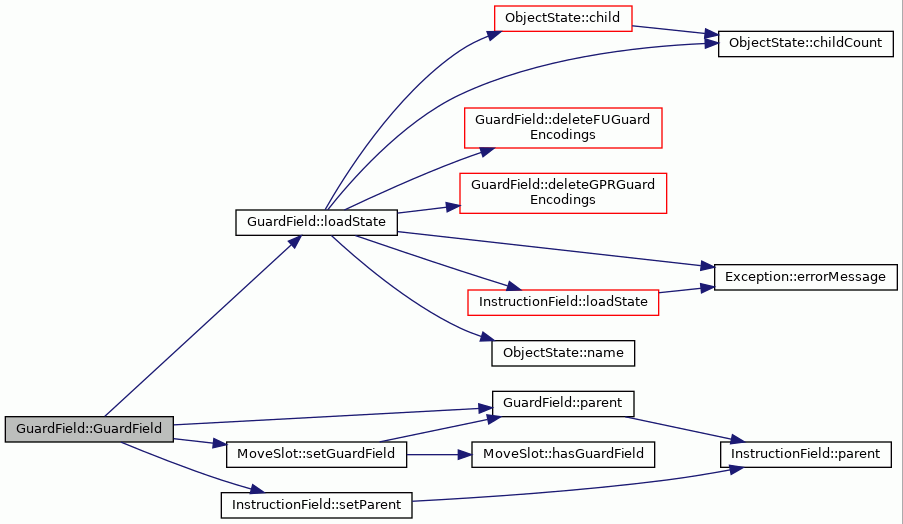
◆ ~GuardField()
|
virtual |
The destructor.
Definition at line 100 of file GuardField.cc.
References assert, deleteFUGuardEncodings(), deleteGPRGuardEncodings(), deleteUnconditionalGuardEncodings(), parent(), InstructionField::setParent(), and MoveSlot::unsetGuardField().
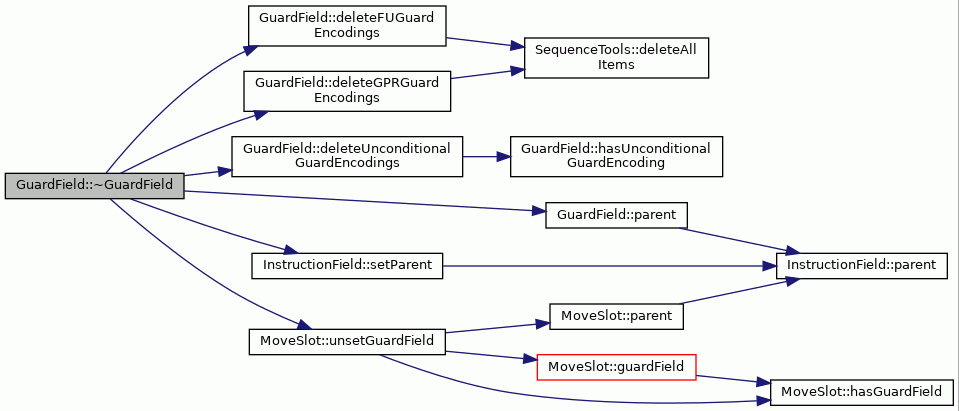
Member Function Documentation
◆ addGuardEncoding() [1/3]
| void GuardField::addGuardEncoding | ( | FUGuardEncoding & | encoding | ) |
Adds a guard expression and its encoding to the set of expressions supported by this guard field.
This method is to be called from the constructor of FUGuardEncoding.
- Parameters
-
encoding The encoding to be added.
- Exceptions
-
ObjectAlreadyExists If the guard field already contains a guard encoding for the same guard expression or if the encoding is already assigned to another guard expression.
Definition at line 183 of file GuardField.cc.
References assert, GuardEncoding::encoding(), fuGuards_, FUGuardEncoding::functionUnit(), hasFUGuardEncoding(), isAssigned(), GuardEncoding::isGuardInverted(), GuardEncoding::parent(), and FUGuardEncoding::port().
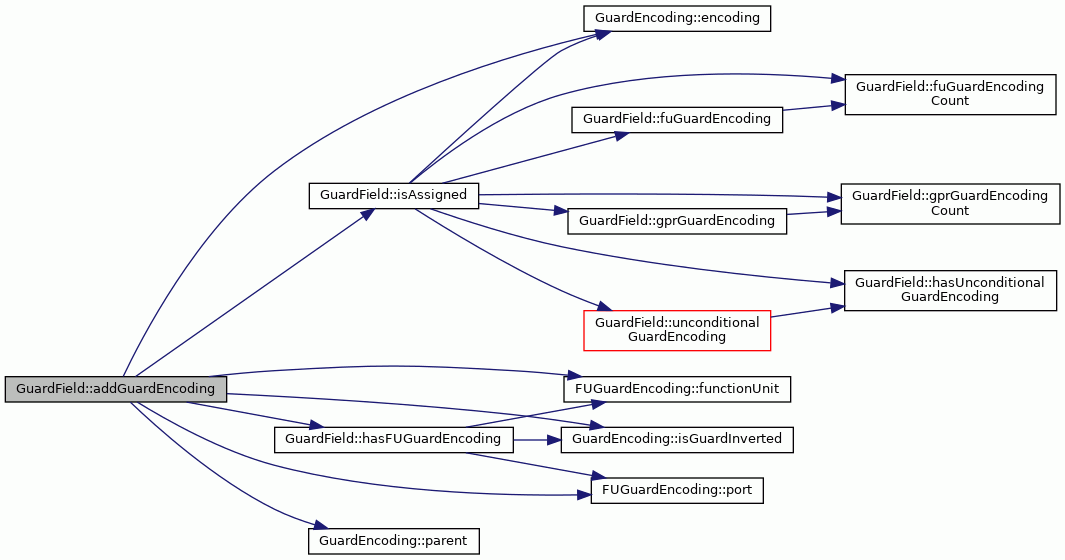
◆ addGuardEncoding() [2/3]
| void GuardField::addGuardEncoding | ( | GPRGuardEncoding & | encoding | ) |
Adds a guard expression and its encoding to the set of expressions supported by this guard field.
This method is to be called from the constructor GPRGuardEncoding.
- Parameters
-
encoding The encoding to be added.
- Exceptions
-
ObjectAlreadyExists If the guard field already contains a guard encoding for the same guard expression or if the given encoding is already assigned.
Definition at line 141 of file GuardField.cc.
References assert, GuardEncoding::encoding(), gprGuards_, hasGPRGuardEncoding(), isAssigned(), GuardEncoding::isGuardInverted(), GuardEncoding::parent(), GPRGuardEncoding::registerFile(), and GPRGuardEncoding::registerIndex().
Referenced by FUGuardEncoding::FUGuardEncoding(), FUGuardEncoding::FUGuardEncoding(), GPRGuardEncoding::GPRGuardEncoding(), GPRGuardEncoding::GPRGuardEncoding(), UnconditionalGuardEncoding::UnconditionalGuardEncoding(), and UnconditionalGuardEncoding::UnconditionalGuardEncoding().
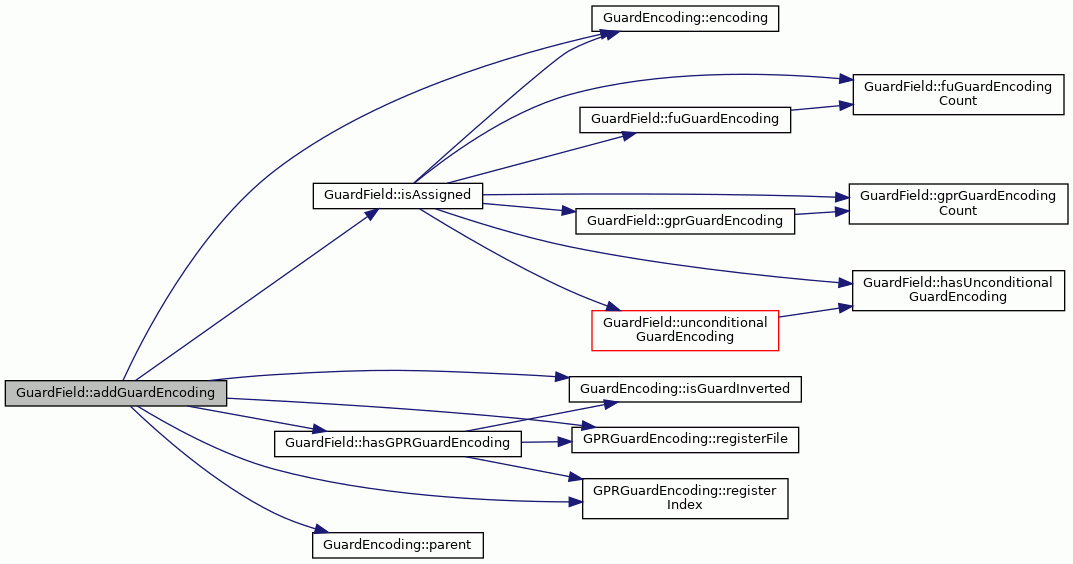
◆ addGuardEncoding() [3/3]
| void GuardField::addGuardEncoding | ( | UnconditionalGuardEncoding & | encoding | ) |
Adds a guard expression and its encoding to the set of expressions supported by this guard field.
This method is to be called from the constructor of UnconditionalGuardEncoding.
- Parameters
-
encoding The encoding to be added.
- Exceptions
-
ObjectAlreadyExists If the guard field already contains an encoding for the same unconditional guard expression or if the encoding is already assigned to another guard expression.
Definition at line 226 of file GuardField.cc.
References alwaysFalse_, alwaysTrue_, assert, GuardEncoding::encoding(), hasUnconditionalGuardEncoding(), isAssigned(), GuardEncoding::isGuardInverted(), and GuardEncoding::parent().
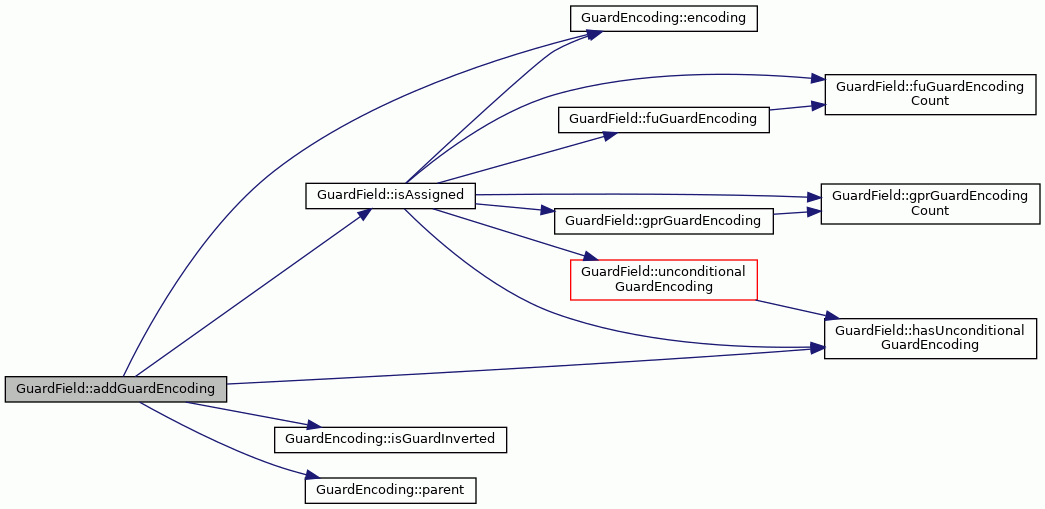
◆ childField()
|
virtual |
Always throws OutOfRange exception since guard field does not have any child fields.
- Returns
- Never returns.
- Exceptions
-
OutOfRange Always thrown.
Reimplemented from InstructionField.
Definition at line 522 of file GuardField.cc.
◆ childFieldCount()
|
virtual |
Always returns 0 because guard field does not have any child fields.
- Returns
- 0.
Implements InstructionField.
Definition at line 509 of file GuardField.cc.
◆ deleteFUGuardEncodings()
|
private |
Deletes all the function unit port guard encodings from the guard field.
Definition at line 664 of file GuardField.cc.
References SequenceTools::deleteAllItems(), and fuGuards_.
Referenced by loadState(), and ~GuardField().

◆ deleteGPRGuardEncodings()
|
private |
Deletes all the register guard encodings from the guard field.
Definition at line 655 of file GuardField.cc.
References SequenceTools::deleteAllItems(), and gprGuards_.
Referenced by loadState(), and ~GuardField().

◆ deleteUnconditionalGuardEncodings()
|
private |
Deletes the unconditional guard encodings from the guard field.
Definition at line 673 of file GuardField.cc.
References alwaysFalse_, alwaysTrue_, and hasUnconditionalGuardEncoding().
Referenced by ~GuardField().

◆ fuGuardEncoding() [1/2]
| FUGuardEncoding & GuardField::fuGuardEncoding | ( | const std::string & | fu, |
| const std::string & | port, | ||
| bool | inverted | ||
| ) | const |
Returns the FUGuardEncoding for the given guard expression.
The expression is identified by a function unit output port (FU name and port name) and by the "invert" flag. Returns a NullFUGuardEncoding instance if there is no such guard.
- Parameters
-
fu Name of the function unit. port Name of the port. inverted The "invert" flag.
- Returns
- FUGuardEncoding of the given guard expression.
Definition at line 443 of file GuardField.cc.
References fuGuards_, FUGuardEncoding::functionUnit(), NullFUGuardEncoding::instance(), GuardEncoding::isGuardInverted(), and FUGuardEncoding::port().
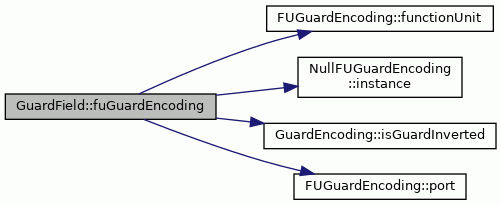
◆ fuGuardEncoding() [2/2]
| FUGuardEncoding & GuardField::fuGuardEncoding | ( | int | index | ) | const |
Returns the FUGuardEncoding at the given position.
- Parameters
-
index The position.
- Returns
- The FU guard encoding.
- Exceptions
-
OutOfRange If the given index is negative or not smaller than the number of FU guard encodings.
Definition at line 387 of file GuardField.cc.
References fuGuardEncodingCount(), and fuGuards_.
Referenced by CodeCompressorPlugin::addBitsForGuardField(), BEMTester::conflictsWithGuardEncoding(), isAssigned(), printGuardFieldEncodings(), saveState(), width(), and DefaultDecoderGenerator::writeSquashSignalGenerationProcess().

◆ fuGuardEncodingCount()
| int GuardField::fuGuardEncodingCount | ( | ) | const |
Returns the number of guard expressions with function unit output term that are encoded in this field.
- Returns
- The number of guard expressions.
Definition at line 373 of file GuardField.cc.
References fuGuards_.
Referenced by BEMTester::conflictsWithGuardEncoding(), fuGuardEncoding(), isAssigned(), printGuardFieldEncodings(), saveState(), width(), and DefaultDecoderGenerator::writeSquashSignalGenerationProcess().
◆ gprGuardEncoding() [1/2]
| GPRGuardEncoding & GuardField::gprGuardEncoding | ( | const std::string & | regFile, |
| int | index, | ||
| bool | inverted | ||
| ) | const |
Returns the GPRGuardEncoding for the given guard expression.
The expression is identified by a general purpose register (register file name and register index) and by the "invert" flag. Returns a NullGPRGuardEncoding instance if there is no such guard.
- Parameters
-
regFile Name of the register file. index The register index. inverted The "invert" flag.
- Returns
- GPRGuardEncoding of the given guard expression.
Definition at line 346 of file GuardField.cc.
References gprGuards_, NullGPRGuardEncoding::instance(), GuardEncoding::isGuardInverted(), GPRGuardEncoding::registerFile(), and GPRGuardEncoding::registerIndex().
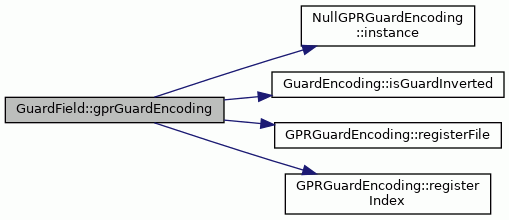
◆ gprGuardEncoding() [2/2]
| GPRGuardEncoding & GuardField::gprGuardEncoding | ( | int | index | ) | const |
Returns the GPRGuardEncoding at the given position.
- Parameters
-
index The position.
- Returns
- The GPR guard encoding.
- Exceptions
-
OutOfRange If the given index is negative or not smaller than the number of GPR guard encodings.
Definition at line 290 of file GuardField.cc.
References gprGuardEncodingCount(), and gprGuards_.
Referenced by CodeCompressorPlugin::addBitsForGuardField(), BEMTester::conflictsWithGuardEncoding(), isAssigned(), printGuardFieldEncodings(), saveState(), width(), and DefaultDecoderGenerator::writeSquashSignalGenerationProcess().

◆ gprGuardEncodingCount()
| int GuardField::gprGuardEncodingCount | ( | ) | const |
Returns the number of guard expressions with general purpose register term that are encoded in this field.
- Returns
- The number of guard expressions.
Definition at line 276 of file GuardField.cc.
References gprGuards_.
Referenced by BEMTester::conflictsWithGuardEncoding(), gprGuardEncoding(), isAssigned(), printGuardFieldEncodings(), saveState(), width(), and DefaultDecoderGenerator::writeSquashSignalGenerationProcess().
◆ hasFUGuardEncoding()
| bool GuardField::hasFUGuardEncoding | ( | const std::string & | fu, |
| const std::string & | port, | ||
| bool | inverted | ||
| ) | const |
Tells whether the guard field has an encoding for the given guard expression.
The expression is identified by a function unit output port (FU name and port name) and by the "invert" flag.
- Parameters
-
fu Name of the function unit. port Name of the port. inverted The "invert" flag.
- Returns
- True if the guard field has an encoding for the given guard expression, otherwise false.
Definition at line 410 of file GuardField.cc.
References fuGuards_, FUGuardEncoding::functionUnit(), GuardEncoding::isGuardInverted(), and FUGuardEncoding::port().
Referenced by addGuardEncoding(), and BEMValidator::checkGuardField().

◆ hasGPRGuardEncoding()
| bool GuardField::hasGPRGuardEncoding | ( | const std::string & | regFile, |
| int | index, | ||
| bool | inverted | ||
| ) | const |
Tells whether the guard field has an encoding for the given guard expression.
The expression is identified by a general purpose register (register file name and register index) and by the "invert" flag.
- Parameters
-
regFile Name of the register file. index The register index. inverted The "invert" flag.
- Returns
- True if the guard field has an encoding for the given guard expression, otherwise false.
Definition at line 313 of file GuardField.cc.
References gprGuards_, GuardEncoding::isGuardInverted(), GPRGuardEncoding::registerFile(), and GPRGuardEncoding::registerIndex().
Referenced by addGuardEncoding(), and BEMValidator::checkGuardField().

◆ hasUnconditionalGuardEncoding()
| bool GuardField::hasUnconditionalGuardEncoding | ( | bool | inverted | ) | const |
Tells whether the guard field has an encoding for unconditional guard.
- Parameters
-
inverted The "invert" flag.
- Returns
- True if there is an encoding for unconditional guard, otherwise false.
Definition at line 471 of file GuardField.cc.
References alwaysFalse_, and alwaysTrue_.
Referenced by addGuardEncoding(), BEMValidator::checkGuardField(), BEMTester::conflictsWithGuardEncoding(), deleteUnconditionalGuardEncodings(), CodeCompressorPlugin::encodeNOP(), isAssigned(), printGuardFieldEncodings(), removeUnconditionalGuardEncoding(), saveState(), unconditionalGuardEncoding(), width(), and DefaultDecoderGenerator::writeSquashSignalGenerationProcess().
◆ isAssigned()
|
private |
Tells whether the given encoding is assigned to a guard expression.
- Parameters
-
encoding The encoding.
- Returns
- True if the encoding is assigned, otherwise false.
Definition at line 692 of file GuardField.cc.
References GuardEncoding::encoding(), fuGuardEncoding(), fuGuardEncodingCount(), gprGuardEncoding(), gprGuardEncodingCount(), hasUnconditionalGuardEncoding(), and unconditionalGuardEncoding().
Referenced by addGuardEncoding(), addGuardEncoding(), and addGuardEncoding().
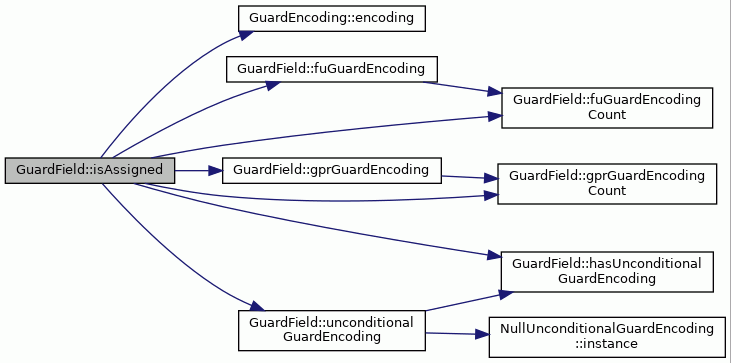
◆ loadState()
|
virtual |
Loads the state of the object from the given ObjectState tree.
- Parameters
-
state The ObjectState tree.
- Exceptions
-
ObjectStateLoadingException If an error occurs while loading the state.
Reimplemented from InstructionField.
Definition at line 585 of file GuardField.cc.
References ObjectState::child(), ObjectState::childCount(), deleteFUGuardEncodings(), deleteGPRGuardEncodings(), Exception::errorMessage(), InstructionField::loadState(), ObjectState::name(), FUGuardEncoding::OSNAME_FU_GUARD_ENCODING, GPRGuardEncoding::OSNAME_GPR_GUARD_ENCODING, and OSNAME_GUARD_FIELD.
Referenced by GuardField().
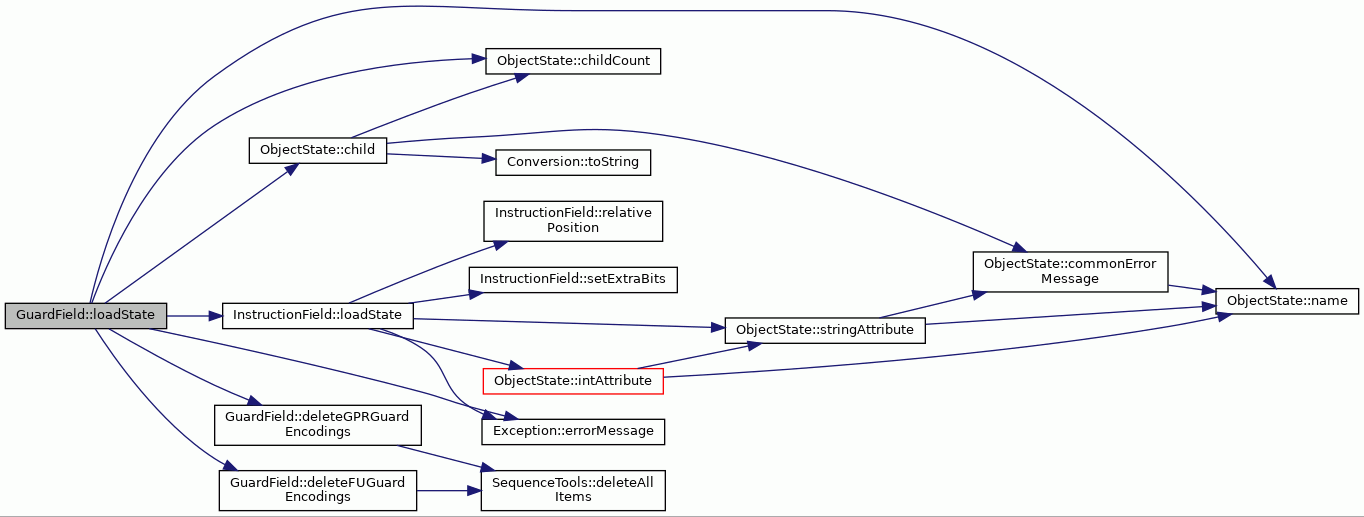
◆ parent()
| MoveSlot * GuardField::parent | ( | ) | const |
Returns the parent move slot.
- Returns
- The parent move slot.
Definition at line 117 of file GuardField.cc.
References assert, parent(), and InstructionField::parent().
Referenced by CodeCompressorPlugin::addBitsForGuardField(), BEMGenerator::addEncodings(), DefaultDecoderGenerator::findGuard(), DefaultDecoderGenerator::findGuard(), GuardField(), GuardField(), parent(), MoveSlot::setGuardField(), and ~GuardField().

◆ removeGuardEncoding() [1/2]
| void GuardField::removeGuardEncoding | ( | FUGuardEncoding & | encoding | ) |
Removes the given guard encoding.
This method is to be called from the destructor of FUGuardField.
- Parameters
-
encoding The encoding to be removed.
Definition at line 205 of file GuardField.cc.
References assert, fuGuards_, GuardEncoding::parent(), and ContainerTools::removeValueIfExists().

◆ removeGuardEncoding() [2/2]
| void GuardField::removeGuardEncoding | ( | GPRGuardEncoding & | encoding | ) |
Removes the given guard encoding.
This method is to be called from the destructor of GPRGuardField.
- Parameters
-
encoding The encoding to be removed.
Definition at line 163 of file GuardField.cc.
References assert, gprGuards_, GuardEncoding::parent(), and ContainerTools::removeValueIfExists().
Referenced by FUGuardEncoding::~FUGuardEncoding(), and GPRGuardEncoding::~GPRGuardEncoding().

◆ removeUnconditionalGuardEncoding()
| void GuardField::removeUnconditionalGuardEncoding | ( | UnconditionalGuardEncoding & | encoding | ) |
Removes the encoding for unconditional guard.
This method is to be called from the destructor of UnconditionalGuardEncoding class.
- Parameters
-
encoding The encoding to be removed.
Definition at line 252 of file GuardField.cc.
References alwaysFalse_, alwaysTrue_, assert, hasUnconditionalGuardEncoding(), GuardEncoding::isGuardInverted(), GuardEncoding::parent(), and unconditionalGuardEncoding().
Referenced by UnconditionalGuardEncoding::~UnconditionalGuardEncoding().

◆ saveState()
|
virtual |
Saves the state of the guard field to an ObjectState tree.
- Returns
- The newly created ObjectState tree.
Reimplemented from InstructionField.
Definition at line 622 of file GuardField.cc.
References ObjectState::addChild(), fuGuardEncoding(), fuGuardEncodingCount(), gprGuardEncoding(), gprGuardEncodingCount(), hasUnconditionalGuardEncoding(), OSNAME_GUARD_FIELD, FUGuardEncoding::saveState(), GPRGuardEncoding::saveState(), saveState(), InstructionField::saveState(), ObjectState::setName(), and unconditionalGuardEncoding().
Referenced by saveState().
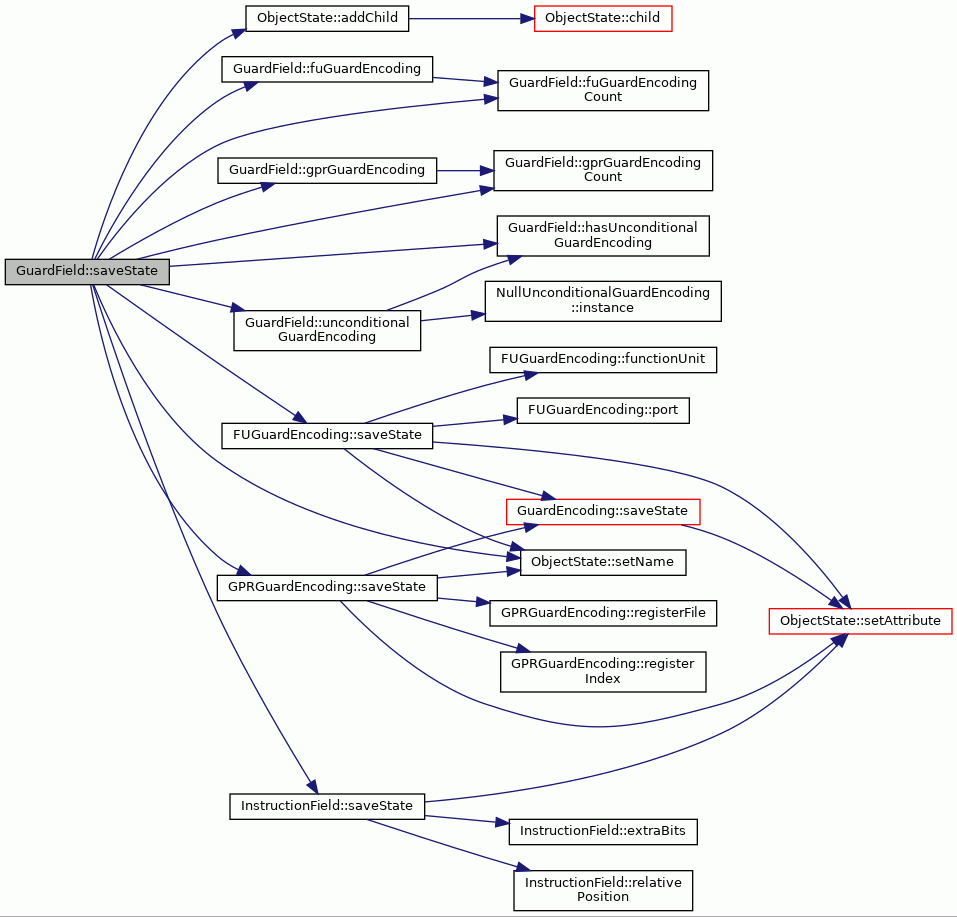
◆ unconditionalGuardEncoding()
| UnconditionalGuardEncoding & GuardField::unconditionalGuardEncoding | ( | bool | inverted | ) | const |
Returns the unconditional guard encoding.
Returns NullUnconditionalGuardEncoding instance if there is no encoding for unconditional guard.
- Parameters
-
inverted The "invert" flag.
- Returns
- The unconditional guard encoding.
Definition at line 490 of file GuardField.cc.
References alwaysFalse_, alwaysTrue_, hasUnconditionalGuardEncoding(), and NullUnconditionalGuardEncoding::instance().
Referenced by BEMTester::conflictsWithGuardEncoding(), CodeCompressorPlugin::encodeNOP(), isAssigned(), printGuardFieldEncodings(), removeUnconditionalGuardEncoding(), saveState(), width(), and DefaultDecoderGenerator::writeSquashSignalGenerationProcess().

◆ width()
|
virtual |
Returns the bit width of the guard field.
- Returns
- Bit width of the field.
Implements InstructionField.
Definition at line 533 of file GuardField.cc.
References MathTools::bitLength(), GuardEncoding::encoding(), InstructionField::extraBits(), fuGuardEncoding(), fuGuardEncodingCount(), gprGuardEncoding(), gprGuardEncodingCount(), hasUnconditionalGuardEncoding(), unconditionalGuardEncoding(), and width().
Referenced by CodeCompressorPlugin::addBitsForGuardField(), BEMTester::canAddComponentPriorityEncoding(), BEMTester::conflictsWithGuardEncoding(), CodeCompressorPlugin::encodeMove(), CodeCompressorPlugin::encodeNOP(), printGuardFieldEncodings(), printMoveSlotLayout(), width(), MoveSlot::width(), DefaultDecoderGenerator::writeInstructionDismembering(), and DefaultDecoderGenerator::writeMoveFieldSignals().
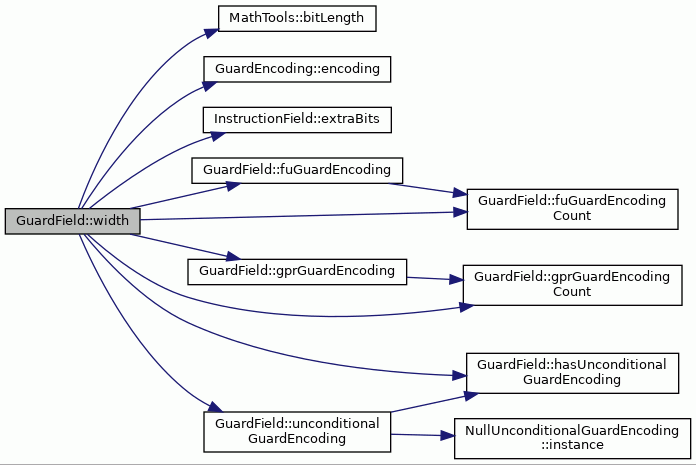
Member Data Documentation
◆ alwaysFalse_
|
private |
Unconditional guard encoding for always-false expression.
Definition at line 119 of file GuardField.hh.
Referenced by addGuardEncoding(), deleteUnconditionalGuardEncodings(), hasUnconditionalGuardEncoding(), removeUnconditionalGuardEncoding(), and unconditionalGuardEncoding().
◆ alwaysTrue_
|
private |
Unconditional guard encoding for always-true expression.
Definition at line 117 of file GuardField.hh.
Referenced by addGuardEncoding(), deleteUnconditionalGuardEncodings(), hasUnconditionalGuardEncoding(), removeUnconditionalGuardEncoding(), and unconditionalGuardEncoding().
◆ fuGuards_
|
private |
FU guard encodings.
Definition at line 115 of file GuardField.hh.
Referenced by addGuardEncoding(), deleteFUGuardEncodings(), fuGuardEncoding(), fuGuardEncoding(), fuGuardEncodingCount(), hasFUGuardEncoding(), and removeGuardEncoding().
◆ gprGuards_
|
private |
GPR guard encodings.
Definition at line 113 of file GuardField.hh.
Referenced by addGuardEncoding(), deleteGPRGuardEncodings(), gprGuardEncoding(), gprGuardEncoding(), gprGuardEncodingCount(), hasGPRGuardEncoding(), and removeGuardEncoding().
◆ OSNAME_GUARD_FIELD
|
static |
ObjectState name for guard field.
Definition at line 99 of file GuardField.hh.
Referenced by BEMSerializer::guardFieldToOM(), loadState(), MoveSlot::loadState(), BEMSerializer::moveSlotToFile(), and saveState().
The documentation for this class was generated from the following files: